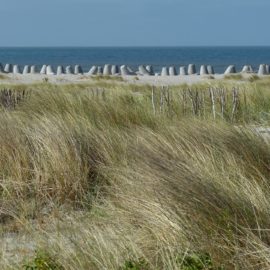
The surplus should be used to save the coast.
Gov. John Bel Edwards urged state lawmakers Wednesday not to veer away from his plan to use surplus money to pay for coastal restoration projects as the legislative session enters its final days, with as much as $157 million in funding for the coast at risk. Edwards made the comments at the State of the Coast conference in New Orleans, the large biennial gathering to discuss Louisiana’s land loss crisis, potential solutions and related issues. With his term in office ending early next year, the Democratic governor spoke of the need to maintain momentum on coastal projects and made a point of stressing that the reality of climate change must be accepted by the state’s leaders and dealt with. Republican Attorney General Jeff Landry, a leading candidate for governor and a frequent sparring partner of Edwards, has called climate change a “hoax.” “They’re deciding right now what to do with one-time funding that’s available because of the surplus and also because of current year excess,” Edwards said, mentioning the June 8 end of the legislative session. “And once again, we’ve asked for a significant chunk of that to go to the coast.” Edwards added that lawmakers should view coastal projects with urgency and not wait to finance them, both to complete them faster and to avoid further hikes in construction costs due to inflation. He called on attendees at the conference to speak with their legislators about the issue. “We have very significant challenges to our coast,” he said. “And a big part of that has to do with climate change, which is real.”
nola.com
$2.2 billion in excess funds and the house wants to pay down debt.
The Legislature is in the midst of a debate over how to allocate some $2.2 billion in extra tax collections, with Edwards and the Senate favoring spending portions of it on infrastructure. The House instead envisions paying down state debt while remaining below a constitutionally mandated limit on annual spending growth. On Monday, the Senate voted to surpass the limit, with Edwards and others favoring that plan arguing that the extra cash offers the state a rare opportunity to address long-overdue infrastructure needs. Chip Kline, chair of the state’s Coastal Protection and Restoration Authority, says as much as $157 million could be at risk for coastal projects if the governor’s plan is scrapped. The legislature last week gave final approval to both the annual $1.6 billion coastal plan and its 50-year, $50 billion coastal master plan. Both are designed to help Louisiana fight the land loss devastating the coast and to build storm protections. While the master plan estimates costs, its approval does not allocate cash. Louisiana’s coastal plans have received a major injection of cash in recent years thanks to settlement money related to the BP Deepwater Horizon oil spill in 2010. That money has gone to large-scale restoration projects along the coast. But the BP funding will run out in 2032, and the state is in the process of finding ways to replace that lost financing. While the state has carried out major land-building projects in recent years, it will face an increasingly uphill battle. Sea level rise exacerbated by climate change poses a serious danger to the coast, in addition to the erosion and subsidence that has caused land loss for decades.
Debt or the coast? Vote for the coast.



